- Home
- John Irving
My Movie Business: A Memoir Page 9
My Movie Business: A Memoir Read online
Page 9
It seemed obvious to me that The Cider House Rules should be made from mid-September to mid-December,
but this didn’t fit Winterbottom’s plans.Yet, in the com-partmentalization of the movie business, the manipulation of the seasons was not my job; my problems with Winterbottom would prove to be more obdurate than the
weather. Now that the Homer-Candy-Wally romance was
in the screenplay, there was less of Dr. Larch and the orphans at St. Cloud’s, and there was much less of Mr. Rose and his daughter and the other migrant pickers. I was afraid that the love story was threatening to become what the movie was about. (When it comes time to “market” the movie, I’m still afraid of that.)
In all the previous versions of the screenplay, Candy and Wally are simply the young couple who come to St. Cloud’s to get an abortion, giving Homer Wells a ride to the coast when they leave. Wally was a small part, Candy even
smaller. My eldest son, Colin, was cast as Wally. But in Winterbottom’s version, Wally’s role had been expanded; not surprisingly, Miramax asked for an actor with a bigger name than Colin’s in the part. More devastating to Colin and me was that Winterbottom thought Colin was too old to be Wally. (Colin was thirty-two at the time, although he could
6190_Irving_15_js.qxd 8/23/99 5:44 PM Page 103
M Y
M O V I E
B U S I N E S S
1 0 3
look younger; I thought he could still play a twenty-five-year-old, maybe.) Winterbottom couldn’t have a Candy who was young enough to suit him, and—in his view—
Wally had to be close to Candy’s age. ( Early twenties.) Candy’s and Wally’s ages became a huge problem for
Winterbottom and me. (Also, including the Homer-
Candy-Wally triangle meant including World War II.) In the novel, Candy doesn’t want to have a baby because she’s still in college and her boyfriend (Wally) is in flight school.
In the screenplay, once I admitted Candy and Wally to the story, I wanted Candy to be already finished with college so that Wally could already be in the Army Air Corps; I wanted him to be through with flight school and ready to leave for the war.
Winterbottom and I never resolved this dispute. Citing too little time to find adequate locations, and no actor of sufficient renown available to play Dr. Larch, Miramax postponed the planned production of The Cider House Rules in April 1997; they wanted Winterbottom to forgo his previous commitment and make the film that fall instead.
Winterbottom refused.
Richard invited me to choose a new director. To my
surprise, and Richard’s, I declined. Despite the problems between us,Winterbottom and I had come a long way together on the screenplay. I couldn’t bear beginning that process with someone else. Once more, I must have been
6190_Irving_15_js.qxd 8/23/99 5:44 PM Page 104
1 0 4
J O H N I R V I N G
tired or distracted (or both); I was again too agreeable for my own good.
As the spring of 1998 approached, Winterbottom ad-
mitted to unsolvable problems in the script and with me; he suggested that only a film in three parts could do justice to the novel, and he thought another writer should be
“brought in.” I had heard the film-in- two-parts idea before, from Tony Richardson. Now Michael Winterbottom
wanted to make a movie in three!
I believe that, from Winterbottom’s point of view, working with me was the principal problem. (Winterbottom had implied to Richard that working with Thomas Hardy was easier.) Perhaps Winterbottom had always wanted to
“bring in” another writer. Frankly, I was tempted to let him.
I could have written another novel in the time I had given to my screenplay of The Cider House Rules, and to three different directors. But precisely because of how hard I had worked to make a movie of this novel, I couldn’t walk away from it and let someone else finish the job.
Also, there was Phillip Borsos to remember. Had Phillip been alive to see how the script had changed, he might have been appalled; he surely would have had trouble recognizing it. Nevertheless, Phillip would have been disappointed in me if I’d walked away. Phillip was no quitter.
Thus Michael Winterbottom and I parted company, and
Richard Gladstein and I were back to where we’d been be-
6190_Irving_15_js.qxd 8/23/99 5:44 PM Page 105
M Y
M O V I E
B U S I N E S S
1 0 5
fore—looking for a director. Number four. I had never heard Richard sound so depressed. At the time, what depressed me more was a foregone conclusion: whenever
The Cider House Rules was finally made into a movie, if ever, my son Colin really would be too old to play Wally.
That opportunity had been lost; with it I lost a sizable part of my love for the project.
6190_Irving_16_js.qxd 8/23/99 5:44 PM Page 106
1 6
L O S I N G W A L L Y ,
K E E P I N G C A N D Y
While everything was difficult,even tortured,
about my first meeting with Michael Winter-
bottom, my first meeting with Lasse Hall-
ström was sublime. In the script that had passed last through Winterbottom’s hands, Lasse said what he missed most of all was the novel’s “epic” quality; even the barest traces of the passage of time had been eliminated.
To play the history of Homer’s failed adoptions as a montage, over which would run the opening credits, was (as I’ve said) Leslie Holleran’s idea. Similarly, Lasse preferred that Homer stay away from St. Cloud’s—that he not return to the orphanage—for at least a year. Between two apple harvests, Lasse suggested, we could
keep alive Larch’s argument with Homer, and Homer’s
increasing involvement with Candy, by means of another
6190_Irving_16_js.qxd 8/23/99 5:44 PM Page 107
M Y
M O V I E
B U S I N E S S
1 0 7
montage—and by using Homer’s and Larch’s letters as
voice-over.
I completely trusted Lasse’s instincts with voice-over because of how extensively he had used that device in My Life as a Dog. I also trusted my instincts with it; I had already made it integral to my screenplay of A Son of the Circus.
It has long been my view that the dislike of voice-over among American moviemakers and film critics is due entirely to how often the device is mishandled; it is frequently tacked on, after a film is shot, to clarify an otherwise incomprehensible story. This misuse of voice-over, as clumsy exposition, gives the device a bad reputation. At its best—for example, in Jules and Jim (one of my favorite movies)—voice-over is essential to the whole; there is nothing “tacked on” about it.
In our very first meeting, Lasse offered a radical solution to the Homer-Candy-Wally triangle—that is, maneuver Homer out of the triangle. Lasse felt that Wally should be a smaller part of the story. Similarly, I felt that if Homer were Wally’s friend, his affair with Candy would be inde-fensible. (In the book, I had almost four hundred pages—
about two thirds of the novel—to make Homer Wells a
sympathetic character before he sleeps with Candy.) It was Lasse’s idea, and I agreed, to get Wally in and out of the story as quickly as possible—before a friendship with Homer can develop. That makes Homer less guilty for the affair with Candy, but at what cost?
6190_Irving_16_js.qxd 8/23/99 5:44 PM Page 108
1 0 8
J O H N I R V I N G
One is always asking that question in the screenwriting process. The constant burden of compressing a story
means that somebody’s character is going to get compromised. By reducing Wally’s time on camera, and diminishing his relationship with Homer, we gave Homer less
responsibility for the affair with Candy—that’s true. But the character who gets compromised is Candy. To save Homer
from the audience’s condemnation, Lasse and I
made Candy the guilty party.
Storytelling in screenplays follows a much more ruthless course than in novels. Homer is a more important character than Candy, and both of them are more important than Wally. Lasse and my solution was not only to reduce Wally’s role and to make Candy the sexual aggressor in her relationship with Homer; we also made Candy less than entirely sympathetic.We had to. (The line I wrote for her, which she says both to warn Homer and in her own defense, is: “I’m not good at being alone.”)
This situation—choosing to compromise one character
so as not to compromise another—is something that happens in writing a screenplay and need never happen in writing a novel. In a novel, there is no reason all the characters can’t be as fully developed (and/or sympathetic) as the writer chooses to make them. In a film, you’re always fighting the constraints of time. There are characters who will be given short shrift. It’s not a choice I like. (Another reason I prefer my day job.)
6190_Irving_16_js.qxd 8/23/99 5:44 PM Page 109
M Y
M O V I E
B U S I N E S S
1 0 9
In restoring the Homer-Candy-Wally triangle to the
script,Winterbottom had inflated it out of proportion. In essence, Lasse said, “Lose Wally, keep Candy.” What happens then between Homer and Candy is a love affair but not a love story. Candy is wrong to have the affair. From the beginning, she’s the one to blame.
The casting was crucial.Wally (Paul Rudd) had to be the quintessential nice guy, but he also had to have the reckless stuff from which heroes are made. He is not quite the dashingly handsome figure that Wally is in the book, nor does he possess even the potential to become Homer’s best friend; yet, as in the novel, Wally is a decent-minded young patrician who can be patronizing without ever intending to give offense.Wally is a basically likable, worldly, adventure-seeking young man.
Homer is a likable, innocent, inward-looking boy. To Candy, Homer is safe. She’s not in danger of terminally losing herself to him; she knows that Homer can never threaten her love for Wally. If in no way a “bitch”—and she is never calculating—Candy is nonetheless self-serving.
And, at least to Homer, she is an older woman; she’s the one in charge. (It helped us to find an actress for Candy who not only looked older than the actor we chose for Homer—she was physically bigger, too.)
Homer (Tobey Maguire) had to look like a kid next to Wally. Next to Candy (Charlize Theron), Homer looks
like a scruffy kid—like no one she would ever look at
6190_Irving_16_js.qxd 8/23/99 5:44 PM Page 110
1 1 0
J O H N I R V I N G
twice. From the beginning, Homer must seem an unlikely replacement for Wally. (The only person Homer should seem likely to replace is Dr. Larch.)
When I first met Tobey and Paul—they came to dinner
together—I was alarmed; they both seemed like kids to me. (Of course this was my problem; it isn’t their fault that I have children older than they are.)
As for “scruffy,” Paul looked scruffier than Tobey. He had long hair and a beard at the time; the people in makeup hadn’t yet made him look like Lieutenant (soon-to-be Captain) Worthington. Tobey was in the company of an attractive, sophisticated girlfriend; he hardly seemed innocent, and he was clearly no orphan. But as soon as I saw them in their respective roles, Tobey was Homer—both an innocent and an orphan—and Paul was exactly the good-guy type that Lasse and I were looking for: the daring pilot, a leader of men.
In the movie, the main thing about Wally is that he isn’t there much; even his heroism happens offscreen. The details of Wally’s plane being shot down, and of his escape from Burma, are reported by Major Winslow (Colin Irving) with an uneasy combination of military precision and concern for Wally’s family; and the details of Wally contracting encephalitis, and his subsequent paralysis, are likewise delivered by the major with an equally uncomfortable combination of medical detachment and guilt. Possibly the major has seen his share of combat and has escaped unharmed;
6190_Irving_16_js.qxd 8/23/99 5:44 PM Page 111
M Y
M O V I E
B U S I N E S S
1 1 1
or else his aura of guilt comes from the fact that he’s always played a noncombat role in the casualty branch—he may not have seen any action at all. Regardless, the effect of the major’s report on Candy—given her guilt for the love affair with Homer—is devastating.
Major Winslow represents a kind of grown-up Wally; he is a vision of the returning hero Wally might have been. But the major is not only an older version of Wally; he’s Wally with no more fooling around. Major Winslow is all business. We get the feeling that Candy likes all business; Wally’s boyishness irritates her. Homer may be younger and less experienced than Wally in many ways—Homer
really is a boy—but Homer is not “boyish.” Homer Wells is all business, too; he’s a very serious boy.
In the novel, we get to see Wally’s heroism in Burma. In the film, we only get to see him come back, a very brief glimpse of him, looking uncharacteristically frail in his wheelchair and surprisingly small in his clothes. For the movie, Wally’s role had been so reduced that I needed to create Major Winslow—not only as the embodiment of
military correctness but also as a voice and a presence that can convey the utter seriousness of Wally’s misadventure.
The major’s news spells an abrupt return to reality for Homer and Candy.
I wanted Major Winslow to be the image of how Candy
might have imagined Wally looking when he came back.
Homer might have imagined Wally returning like Major
6190_Irving_16_js.qxd 8/23/99 5:44 PM Page 112
1 1 2
J O H N I R V I N G
Winslow, too—that is, if Wally had survived the war in-tact. Nor was the irony lost on my son Colin and me: that Colin was now too old to play Wally made him a perfect Major Winslow. But, at thirty-four, Colin had imagined himself in the role of Wally for a decade; that he was forced to accept the much smaller role of Major Winslow was a disappointment to him, and to me.
In screenplays that are adaptations from novels, you must occasionally create new characters to represent those lost moments in the lives of the original characters—hence Buster (Kieran Culkin), to represent Homer-as-a-kid.You must also create new characters to compensate for whole characters who are missing from the script—hence Mary Agnes (Paz de la Huerta), to represent both Melony, who is such a huge loss, and Nurse Caroline (also missing), who is romantically paired with Homer at the novel’s end.
It goes without saying that Melony is essential to the novel of The Cider House Rules, and she provides the narrative with more than her own unchecked aggression.When Homer leaves the orphanage with Wally and Candy, he betrays Melony. She searches for him for the rest of the novel; when she finds him, she is disgusted with how he’s turned out (trapped, as he is, in the unwholesome triangle between Wally and Candy).
Melony instantly recognizes that the child Homer and Candy have “adopted” is actually their own. She manages
6190_Irving_16_js.qxd 8/23/99 5:44 PM Page 113
M Y
M O V I E
B U S I N E S S
1 1 3
to make Homer so ashamed of himself that she is also a precipitating reason for his return to St. Cloud’s. Melony is the one who confronts Homer Wells with the fact that he has not become the hero of his own life. “I had you figured all wrong,” she tells Homer. “I somehow thought you’d end up doin’ somethin’ better than ballin’ a poor cripple’s wife and pretendin’ your own child ain’t your own.”
In the film, without Melony to tell him where he’s gone wrong, Homer Wells has to become the hero of his own life on his own. Mary Agnes can never replace Melony—
no one can. Mary Agnes can (and does) do a better job of replacing
Nurse Caroline.
When we first see Mary Agnes in the movie, she wants Homer to examine her tongue; maybe she bit it kissing someone, she says. Maybe you bit it in your sleep, Homer tells her—not responding to her come-on. Maybe I bit it while I was dreaming about kissing someone, Mary Agnes says. But more about Mary Agnes later. In casting, in order of importance, after Homer and Larch, Candy came next.
When I first met Charlize Theron, our unfaithful Candy, the line I wrote for her seemed as natural a part of her as her lipstick. If a stranger who looked like Charlize were to come up to a young man at a party, and if she said, “I’m not good at being alone,” well, there aren’t many young men who wouldn’t instantly comply. Most young men I know would follow at her hip as dutifully as her shadow.
6190_Irving_16_js.qxd 8/23/99 5:44 PM Page 114
1 1 4
J O H N I R V I N G
In the movie, Candy never stops loving Wally; she just can’t stand worrying about him. Being with Homer helps Candy not to think about Wally away at the war. What Lasse understood about the Homer-Candy-Wally situation was not only that it shouldn’t overshadow Homer’s relationship with Dr. Larch or Homer’s discovery of Mr.
Rose’s relationship with his daughter; Lasse also knew that Homer’s love affair with Candy was not a true romance.
Only in Homer’s eyes does his relationship with Candy have romantic potential; the audience should know from the outset that it’s not going to work.
At first sight, at least the male audience will get it: any-body could fall for Charlize Theron. Nor should it be difficult for the entire audience to draw a medium-quick
conclusion: to wit, how unlikely it is that Charlize could truly fall in love with Tobey Maguire. One glimpse at the two of them together should suffice; we know Homer’s going to get hurt. It sounds awfully simple to say this, but here’s another enormous difference between novels and films: in the movies, what people look like truly matters.
6190_Irving_17_js.qxd 8/23/99 5:46 PM Page 115
1 7
A T E R S E S P E C U L A T I O N
O N T H E M O V I E P O S T E R
am fond of teasing Richard by telling him that if Candy and Homer (or just Candy) end up on the movie poster Iof TheCiderHouseRules, we have failed.The film is not about that romance—that non romance, as I refer to it when I’m talking to Richard. Dr. Larch, with or without Homer, should be on the movie poster. Ideally Larch

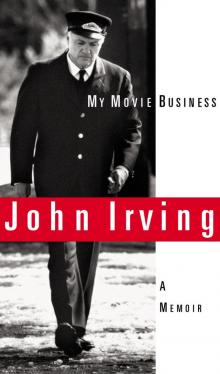 My Movie Business: A Memoir
My Movie Business: A Memoir In One Person
In One Person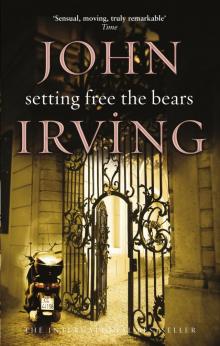 Setting Free the Bears
Setting Free the Bears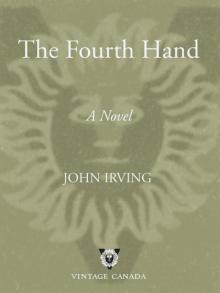 The Fourth Hand
The Fourth Hand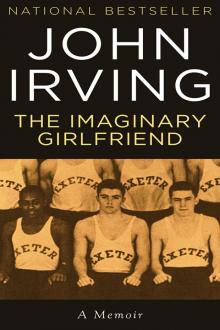 The Imaginary Girlfriend
The Imaginary Girlfriend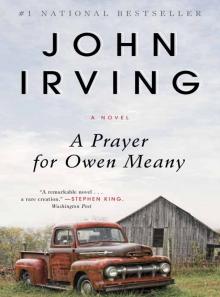 A Prayer for Owen Meany
A Prayer for Owen Meany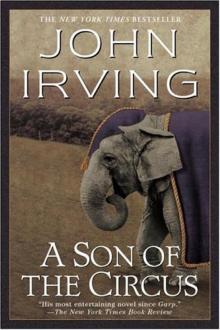 A Son of the Circus
A Son of the Circus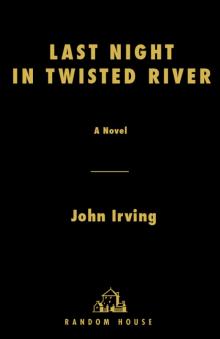 Last Night in Twisted River
Last Night in Twisted River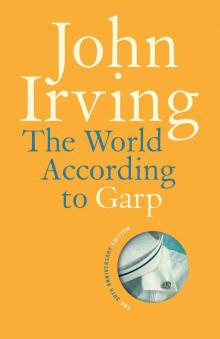 The World According to Garp
The World According to Garp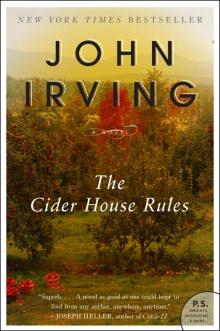 The Cider House Rules
The Cider House Rules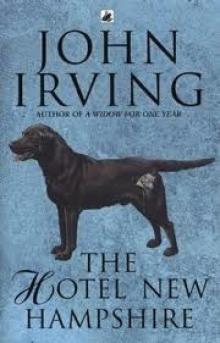 The Hotel New Hampshire
The Hotel New Hampshire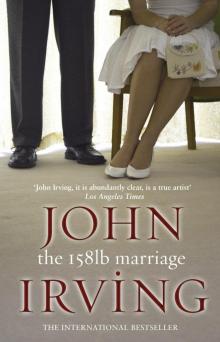 The 158-Pound Marriage
The 158-Pound Marriage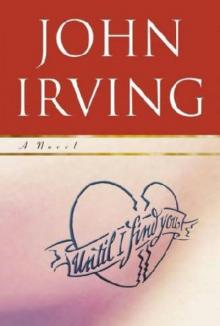 Until I Find You
Until I Find You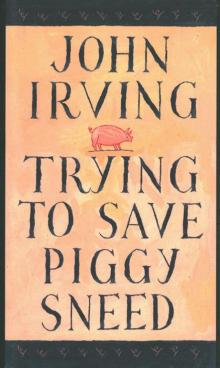 Trying to Save Piggy Sneed
Trying to Save Piggy Sneed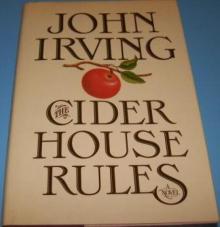 Cider House Rules
Cider House Rules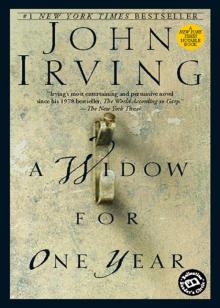 A Widow for One Year
A Widow for One Year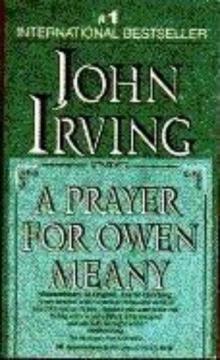 A prayer for Owen Meany: a novel
A prayer for Owen Meany: a novel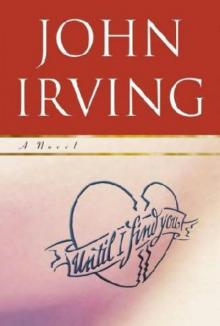 (2005) Until I Find You
(2005) Until I Find You